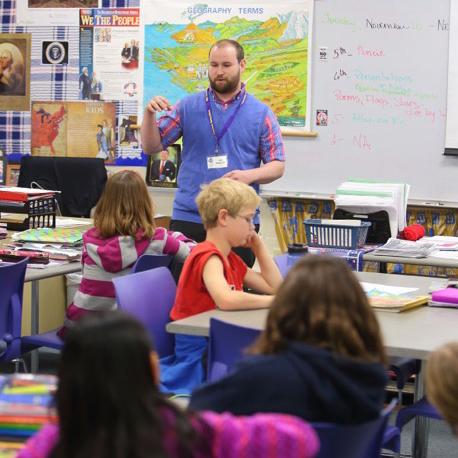Teacher Education seeks input

Apr 11, 2016
UNI has long been thought of as a leader in teacher education, both in Iowa and across the nation. In the fall of 2015, the Board of Regents tasked UNI with developing a strategic plan for the work it is doing to train teachers, according to head of the department of Educational Leadership, Nick Pace.
This request sparked the formation of The Teacher Education Strategic Initiative (TESI).
“While teacher education has been a central part of UNI’s mission since our founding,” Pace said, “we have never had a strategic plan for it.”
Pace explained that the university decided to take this as an opportunity to build on its already well-established program and to look for new ideas.
UNI Provost, Jim Wohlpart, asked Pace and Cindy Diehl-Yang, director of the Center for Educational Transformation, to co-facilitate the TESI process.
Diehl-Yang and Pace then asked for volunteers and, according to Pace, had more than 50 people from 27 different academic departments and all four colleges step forward.
“Since October we’ve been in conversations and research into what we do well, things we could improve on and things we could launch,” Pace said.
Pace went on to say that TESI is covering a large range of subject areas that include: building a new teacher education curriculum, supporting teachers across their career spans and eliciting feedback from Area Education Agencies, teachers, alumni, school administrators and UNI education majors.
Part of this process, Pace explained, are listening tours across the state and listening posts for education majors on campus this month. The first listening post took place on April 4 in the Hemisphere Lounge in the Maucker Union.
Approximately 15 students were in attendance, many of whom discussed their issues with the teacher education program at UNI.
These issues ranged from students calling for more formal training in lesson planning to one student commenting that “the amount of behavior management we’re taught is almost demeaning.”
Senior English education major, Zachary Wiemers said that his entire Teaching of English class had comments about the education system, and so they decided to go this listening post together.
Wiemers said the level three portion of the program feels unstructured to most students.
“The different required classes for education all teaching the same thing, all of them being very overlapped, a lot of it feeling like wasted credits, a lot of useless requirements,” Wiemers said.
This seemed to be a common theme among the students, especially regarding behavior or classroom management and educational technology.
“There is one [class] dedicated to behavior management,” Wiemers said, “but every single education class touching on behavior management.”
Wiemers also noted that, while he listens to his behavior management material in class, he’s never actually studied for a behavior management test. He explained that for him it’s fairly common sense.
According to Wiemers, the most important thing education majors can get is experience in the classroom. Fellow senior English education major, Josie Finney agreed.
“I think as students here at UNI, we struggle a lot with how teachers write [lesson plans] practically, because here at UNI we’re typically given a template and told to fill out the template,” Finney said.
Finney explained that it would be more useful to learn the different aspects of writing a lesson plan. She said students must write two extremely long lesson plans in their level two programs, but that most of her teachers have just had a bulleted list of what they are going to teach for the week.
Finney continued to return to the idea of experience in regards to all aspects of teaching, from planning lessons to controlling the classroom.
TESI is a large project for the university, as demonstrated by the number of people and organizations involved. Some students, such as Wiemers and Finney, hope that TESI can set a new standard for excellence.
“Right now, I can see [UNI] headed toward leadership, but I don’t think we’re quite there yet,” Finney said. “But I think by getting students’ input, they’re coming a long way.”
Pace described TESI as a “golden opportunity” to allow the UNI teacher education program to “dream big in a way that honors our past and embraces who we want to be as a leader in educator preparation.”
The remaining listening posts will be held on April 13 at 9:30 a.m. and April 14 at 1:00 p.m. in the Hemisphere Lounge in Maucker Union.














